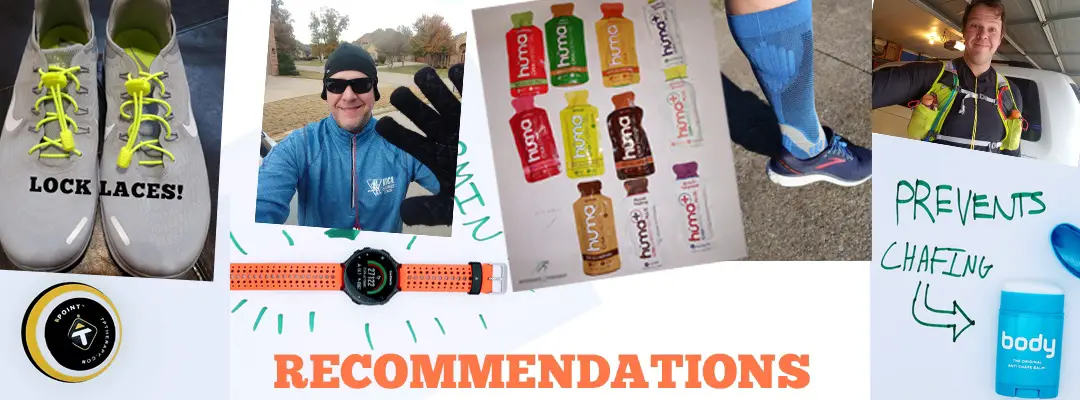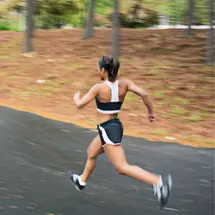As a runner, there’s a strong chance that you’re interested in improving your running speeds. Although that’s quite challenging to do, it’s certainly possible if you take the correct approaches.
You can increase your running speed through 3 approaches: improved training, nutrition, and recovery. Start by incorporating strength training, hill runs, and speed sessions. Then, be mindful of the foods you eat to optimize your nutrition for running performance. Lastly, take time to recover with sufficient sleep and a weekly off-day. Combining these things will make you a faster runner in a few weeks or months.
This guide has everything you need to know to improve your running performance. So keep reading to learn the training, nutrition, and recovery tips to help you run faster.
How Can I Increase My Speed In Running?
Here’s the honest truth about increasing your running speed: there is no magic bullet. No hack or unique technique will magically make you run faster than everyone else.
Instead, hard work and dedication are the only ways you’ll become a fast runner. Once you accept that, you’ll be ready to learn how to train yourself for the next level.
Here are 8 tips for training yourself to become a faster runner the right way!
#1 Be Consistent
The first step to improve your running performance is to train consistently.
There’s a strong chance that this isn’t your first time hearing this advice. Well, you hear this advice so much because it’s true.
No matter how you train, you have to do it consistently to see performance improvements.
So if you’re just a once-in-awhile kind of runner, developing your speed will be pretty challenging. That’s because you’re failing to challenge your running muscles enough to force them into becoming stronger.
However, if you consistently put stress on your muscles and push yourself just a little harder each time, your overall performance will gradually improve.
#2 Strength Training
Here’s a plot twist for many runners, particularly newbies: strength training will make you run faster.
That’s right! Lifting weights in the gym and doing bodyweight strength exercises will improve your running performance and make you faster.
But here’s the catch: you have to target your running muscles when you train for strength.
The muscles that affect your running speed include:
- Hamstrings.
- Glutes.
- Lower back.
- Quadriceps.
As you can see, leg days aren’t just crucial for bodybuilders. They’re critical for runners like you who want to increase their speed.
#3 Train on Hills
Another helpful method for building running speed is to incorporate hill uphill running.
That’s another counter-intuitive approach that might not make sense at first. Still, hill training is so practical that plenty of running coaches swears by it.
Here’s why:
Hill running affects your performance in two ways. Firstly, it helps to increase your V02 max. That number measures how much oxygen your body can use during heavy exercise.
So, hill runs make you much more efficient as a runner in terms of oxygen use. In simple terms, the faster your body can use oxygen, the quicker your body can produce energy and make you run faster.
The second reason hill running is excellent is related to #2 above. When you run up a hill, you place a heavier burden on muscles like your glutes and hamstrings, among many others.
That means you’re strengthening the muscles that make you go faster when running on a flat surface.
#4 Try Interval Training
Another tool to use is interval training. That’s when you alternate between brief periods where you run as fast as possible, followed by a recovery period.
A straightforward example of interval training is running all-out for 1 minute before slowing down to a walk for a few minutes to catch your breath.
Running intervals like that will build your muscular strength (like what we saw in #2 and #3 above), and it’ll increase your aerobic endurance.
Aerobic endurance is what will keep you going for longer when you’re running at your maximum speed.
#5 Speed Training
Even if you’re new to running, you know that it’s not smart to train at your highest speed all the time. After all, you’re a runner, not a sprinter.
However, you should dedicate some of your weekly training sessions to doing just that. During these sessions, you’ll run as fast as possible, pushing your limits each time.
Firstly, speed training will help you understand your maximum running speeds.
But more importantly, it will also prepare your body to sustain your top speeds for more extended periods.
Remember: running fast is one thing, but sustaining that for long enough to win your race is a whole other challenge in itself.
#6 Tweak your Nutrition
No matter what sport you’re in, training isn’t the only aspect influencing your performance. Nutrition is also a critical factor, and some people would argue that it’s even more important than training.
So to be a faster runner, you must take advantage of specific foods that benefit runners in particular.
For example;
- Oats are a popular option because they keep you full and regulate your blood sugar. In addition, as a runner, oats will provide you with sustained energy when you eat them before a run.
- Spinach is a superfood that packs a wide range of vitamins. Eating spinach can ensure that your body has all the nutrients it needs to perform at its highest levels.
- Beetroot is a food that many runners take advantage of because of its nitrates. Those nitrates improve blood flow to your muscles, helping them perform at maximum capacity.
#7 Drink Coffee
This tip is somewhat related to the previous one about nutrition: drink your coffee. Still, you should treat coffee separately because it’s not too often you want to use it.
As you might already know, coffee gives your body an intense energy boost on demand. But that will only work if your body isn’t desensitized to coffee.
So, if you want to use coffee to run faster, be sure to drink it sparingly. Alternatively, you can stick to drinking decaf regularly and only save the caffeine for your pre-run drink.
Related: Does caffeine boost running performance? How much caffeine should I consume?
#8 Prioritize Recovery
Here’s another old piece of advice that many runners neglect. To become a faster runner, you must prioritize your recovery.
Pushing your limits and training regularly is excellent, if not necessary, to become a fast runner. However, failing to give yourself enough time to recover will prevent you from increasing your performance and speed.
You see, your muscles must grow stronger before they can help you run faster. By training daily without enough recovery time, your muscles won’t have a chance to fix themselves and grow.
So, here are some basic principles for your recovery plan:
- First, take one full day off per week to recover.
- Next, make sure that you’re getting a whole night’s sleep every day. Your running muscles need that time to recover before your next training session.
Final Thoughts
When you consider the tips listed above, you’ll notice a pattern. The things that make you a faster runner boil down to 3 items: how you train, eat, and rest.
You won’t master all 3 areas simultaneously. That’s why it’s crucial to be patient with yourself. Educate yourself and aim to improve in those areas a little bit each day, and you’ll find that your top running speed will rise the same way.
Frequently Asked Questions (FAQs)
Here are some additional answers that you’ll find helpful to run faster:
How Long Does It Take To Develop Running Speed?
Everybody’s body is different. Some runners will notice performance improvements in a few weeks, while others might require a few months.
What Attributes Affect Your Running Speed?
Some of the attributes that affect your running speed include your age and gender. Due to hormones and body sizes, males tend to run faster than females, and younger runners perform better than older runners.
At What Age Are You The Fastest?
Typically, runners will reach their fastest running speeds between 18 and 30. But, of course, there are exceptions from time to time.
At What Age Do Runners Slow Down?
Runners will gradually lose their speed after the age of 40. However, the decrease in speed is more dramatic when runners reach their late 70s.
| Help support me and subscribe to my YouTube channel. YouTube video - 30 ways to make your runs less painful! Coach Scott's Credentials:
|
To sign up for a FREE half marathon training schedule, log sheet, and pace predictor CLICK HERE.

Recommended gear for runners
Connect with me:
| facebook.com/BeginnerToFinisher/ |
References
https://www.insider.com/how-to-run-faster
https://www.runnersworld.com/training/a20845443/improving-speed-and-endurance/

